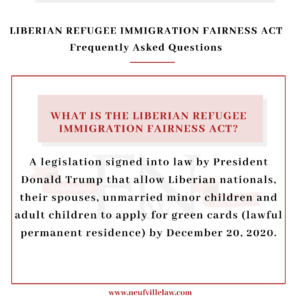U.S. Immigration Laws provide a method for a U..S. citizen or a lawful permanent resident (LPR) to sponsor the immigration of a family member abroad. The ease and speed in which this can be accomplished depends on the relationship of the family members, whether the sponsor is a U.S. citizen or an LPR, and , sometimes, the country where the family member is located.
Preliminarily, the Immigration and Nationality Act (INA) creates two broad groups for family members: immediate relatives and family-based preference categories.
“Immediate Relatives”
In the “immediate relative” category, the petitioner must be a U.S. citizen (not an LPR); the eligible family members include the petitioner’s
- spouse
- parents (if the petitioner is at least 21 years old), and
- unmarried children under the age of 21.
Procedurally, the immediate relative category has advantages over the preference categories. There are no numerical limitations on the number of immediate relatives who might emigrate from an country. Further, if they entered the U. S. legally, “immediate relatives” are exempt from certain “bars,” such as unauthorized employment, overstaying their time of admission, or violating their specific nonimmigrant status.
On the other hand, spouses and children of immediate relative immigrants — unlike those of preference aliens — do not obtain”derivative” status. In other words, if a person immigrates as an immediate relative parent of a U.S. citizen, that person’s spouse or minor children would not also automatically qualify for immigration visas, whereas a spouse or minor child of a preference alien would automatically qualify.
The Family-Based Preference Categories
As noted above, those family members who don’t fall into the “immediate relative” classification will be subject to numerical limitations, which vary depending on which of the preference categories (described above) applies.
Note: “Sons and daughters” vs. “children” — Once a child is either married or over the age of 21, he or she is no longer a “child” for purposes of the INA. The statute instead refers to these offspring as”sons and daughters.”
Family One — Unmarried sons and daughters of U.S. citizens.
While children (i. e., unmarried, under 21) of U.S. citizens are “immediate relatives,” unmarried offspring who are 21 or older will fall into the Family One category. The waiting period in this category is currently over 10 years for Mexico, over 14 years for the Philippines, and approximately four years for most other countries.
Family Two — Spouses, children, and unmarried sons and daughters of lawful permanent residents (LPRs).
Spouses and unmarried minor children of LPRs (“Family 2A”) are subject to delays of over four years (over seven for Mexicans). The wait for unmarried “sons and daughters” of LPRs (“Family 2B”) is nearly 10 years (over 13 for Mexicans).
Family Three — Married sons and daughters of U.S citizens.
For all countries except Mexico and the Philippines, the waiting period is over seven years. For Mexico and, especially, the Philippines, the time interval is substantially longer.
Family Four — Brothers and sisters of U.S. citizens
This category has tremendous delays– nearly 12 years — for all countries. The waiting period for the Philippines is over 20 years.
Conditional Permanent Residence for Spouses
Where a party obtains an immigrant visa or lawful permanent residence based on marriage as either an immediate relative or a Family 2A beneficiary, and where the marriage is less than two years old, that individual is granted conditional permanent resident status. This “conditional status” lasts for two years from the date that person becomes a lawful resident, not two years from the original marriage date.
The person must petition to remove this status. If the parties are still married, they can jointly petition to remove this conditional status within the 90-day period before the two-year anniversary of the grant of conditional status. If a joint petition cannot be filed, the conditional resident can file for a waiver in certain circumstances, including an intervening divorce (assuming the marriage was entered into in good faith).
Children who obtain status as either a “child” or “stepchild” based upon marriage of less than two years are also conditional residents and must file to have their conditional status removed. Where the parent is also a conditional resident, the parent can include the child in his or her application.
Affidavit of Support
A legally enforceable Affidavit of Support (Form I-864) must be completed by U.S. citizens and LPRs who sponsor family members as immigrants. The law requires the sponsor to demonstrate an income level at or above 25% of the federally established poverty line.
If the sponsor’s household income does not meet the income requirements, evidence of assets, such as cash in savings accounts, stocks, bonds, or property, may be considered in determining the sponsor’s ability to support the immigrant.
If the sponsor cannot meet the required income level based on income and assets, another person may serve as a joint sponsor.
















